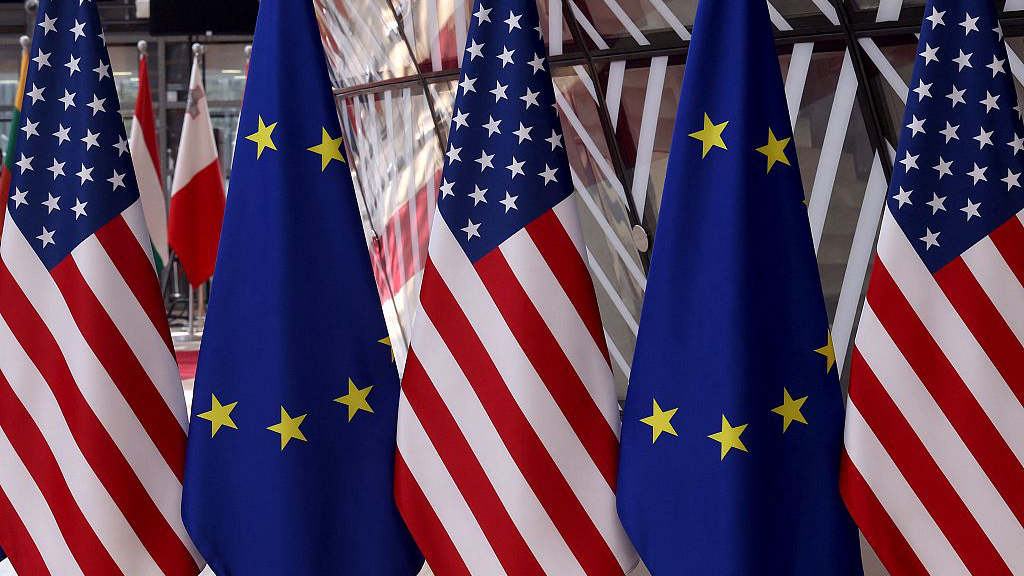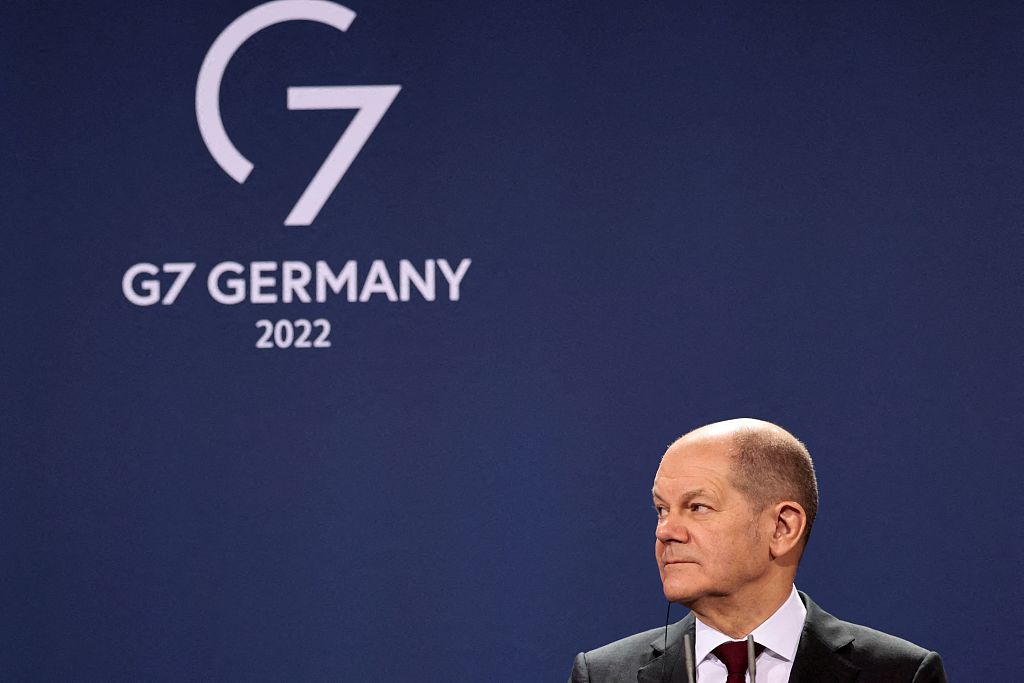
This pictures shows flags prior to an EU - US summit at the European Union headquarters in Brussels, June 15, 2021. /CFP
This pictures shows flags prior to an EU - US summit at the European Union headquarters in Brussels, June 15, 2021. /CFP
Editor's Note: Freddie Reidy is a freelance writer based in London. He studied history and history of art at the University of Kent, Canterbury, specializing in Russian history and international politics. The article reflects the author's opinions and not necessarily the views of CGTN.
As with so much of the promise held for the presidency of Joe Biden, closer relations between Europe and the U.S. appear to be harder to achieve than hoped. Trade disputes and the continued entrenchment over the regulation of Big Tech have cooled relations. Coordinating a response to the Ukraine crisis is also proving to be another diplomatic stumbling block.
The response from Washington to increased tensions between Ukraine and Russia in the Donbas region has also been muddled from the outset. U.S. Secretary of State Antony Blinken headed to Europe to shore up NATO support for a meaningful deterrent to an escalation of hostilities only for Biden to conduct a haphazard press conference where he claimed that a "minor incursion" may yield a different response and that Russia would "prevail over time."
The struggle which Biden faces though is partly a consequence of the actions of his predecessor, Donald Trump. The shift in attitude towards Europe during this time caused European powers to seriously revaluate its reliance on the United States.
While Trump can be credited with bolstering the financial contribution of NATO members to the organisation, in line with their treaty obligations, a starker bifurcation of strategic priorities emerged.
This sea-change did not abate when President Biden assumed office and while he claimed that "America is back," the EU has been reevaluating its own strategic priorities. It is an evaluation which gathered pace in the wake of the U.S. withdrawal from Afghanistan.
Biden appears slow to appreciate this new reality, and the response to the Ukraine issue appears to indicate that the days of U.S. policy domination among European allies appears to be over.
This is partly due to a U.S. reluctance to dominate on the issue as well as a reluctance to intervene or commit in what would be a major distraction to the State Department's theater of choice - Asia.
The U.S. is of course the undisputed military power within NATO, but if the principal sanctions to what the White House perceives as state aggression is of an economic nature, then the rules of the game are altered and the balance of power within the alliance is altered. The economic consequence of mass sanctions would fall disproportionately on EU members and thus the EU will take a more muscular approach in defending its own interests.
A reluctance to militarily commit though, does not appear to have translated into any reluctance in unilaterally intervening in European affairs, a fact exposed at a joint press conference held on Tuesday which included the German Chancellor, Poland's President and the French President.

German Chancellor Olaf Scholz looks right during a joint press conference with Poland's President and French President ahead of a Weimar Triangle meeting at the chancellery in Berlin, February 8, 2022. /CFP
German Chancellor Olaf Scholz looks right during a joint press conference with Poland's President and French President ahead of a Weimar Triangle meeting at the chancellery in Berlin, February 8, 2022. /CFP
Biden declared that the Russo-German Nord Stream 2 pipeline could be cancelled should there be an escalation in Ukraine. "There will be no longer a Nord Stream 2. We will bring an end to it… I promise you, we will be able to do that."
Scholz refused to endorse Biden's statement and instead offered a broader promise that "there won't be any measures in which we have a differing approach."
Diplomatically too, the EU appears to have deviated from NATO's script. President Macron, who currently holds the EU rotational presidency, flew to Moscow for bilateral talks and later declared "I secured an assurance there would be no deterioration or escalation." A claim somewhat dampened by the Kremlin who stated that the notion of a guarantee was "not right."
However, what is evident from Macron's words is that it is Europe's intention to bring Russia further into the European sphere in its own interests and not be used an accessory for American foreign policy.
Macron, three months out from a presidential election, appeared resolute that the "the mistakes of the past about spheres of influence" should not be repeated and that "Russia is European. Whoever believes in Europe must know how to work with Russia and find the ways and means to construct a European future among Europeans."
While a peaceful de-escalation to tensions in the Donbas is in the interests of all nations, the path to peace is fraught with political intrigue, not least the growing divide between American hegemony and Macron's vision of a more autonomous Europe.
(If you want to contribute and have specific expertise, please contact us at opinions@cgtn.com.)

